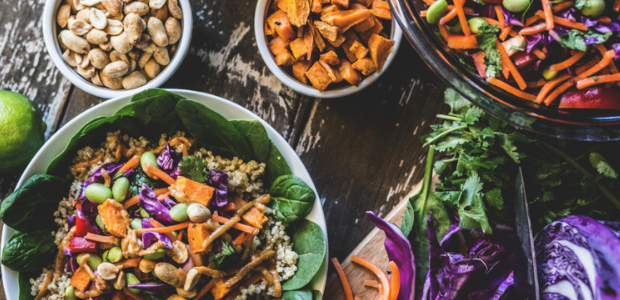Plant-Based Nutrition to Limit Food Intolerances
Since my beginnings in the natural food industry, I've come a long way. Vegetarianism did not yet have a prominent place in food culture, and only the Canadian Food Guide was recognized, with its strengths and weaknesses. With the arrival of the Internet, health information has taken off, and it is now widely accepted to make the link between what we eat every day and our health. Vegetarianism, vegan eatinghypotoxic diet, the ketogenic dietdiet Fodmap dietdiet gluten-free diet and dairy-free diets are just a few examples..3
The vivid connection made between the consumption of gluten in bread, dairy products and intestinal ailments has revolutionized the way we eat. The industry has come a long way to satisfy our taste buds, which are resistant to change.
Dietary changes and food intolerances
Since the recognition of food intolerances implied major changes in lifestyle, the transition to alternative solutions was not without resistance at first. Dairy products and gluten in wheat, which had always been part of our dietary base, came under suspicion and were now in the dock.
What's more, the industry was unprepared for this scourge. But the evil of intolerance continued to wreak havoc. The diet needed to alleviate the problem seemed to be an all-or-nothing affair, in other words, the foods that caused all those uncomfortable and even painful symptoms had to be avoided..1, 3
What is food intolerance?
Food intolerance is a physiological response which, unlike allergy or sensitivity, does not involve activation of the immune system. Although food intolerance often manifests itself at the digestive level, equally non-specific manifestations can be felt, starting with fatigue or headaches. It occurs when the body is unable to digest a specific food.
What are the main causes of food intolerance?
Several factors can cause intolerance, such as the absence of an enzyme that facilitates digestion of a food, inflammation of the intestinal mucosa (irritable bowel syndrome), stress, the consumption of alcohol or certain medications, and so on.
The main symptoms are bloating, diarrhoea, nausea, gastric reflux, gastric pain, constipation, fatigue, joint pain, skin rashes, etc..1, 2, 3
Finding the source of food intolerance
This can be a real headache, since symptoms can appear quickly after ingesting the food, or take hours or even days. And to complicate the search, a small dose can sometimes be tolerated and completely confuse the issue. Unfortunately, the problem food is sometimes difficult to identify or remove from the diet. A long process is required, such as the reappearance of symptoms after reintroducing a food removed from the menu, to confirm whether or not you are sensitive to it..1, 2, 3
Lactose intolerance
Unable to be absorbed due to a lack of lactase (the enzyme specific to lactose digestion), lactose remains in the intestine, causing diarrhea. What's more, in the large intestine, lactose is degraded by bacterial flora, leading to the formation of gas, which causes diarrhoea and bloating, as well as abdominal pain..1, 2, 3
Reflections on the consumption of animal milk :
- No wild animal feeds on the milk of another animal.
- No wild animal continues to drink milk after weaning1
Nowadays, with all the gluten-free and dairy-free products on the market, it is possible through trial and error and without too much effort or feeling of deprivation to eat without pain or symptoms associated with food intolerances..3
Daiya, a plant-based diet
The company Daiya (or DAY-AH, Dairy and Dayaa) comes from a play on words meaning 'love, kindness and compassion' in Sanskrit.
The Canadian company Daiya s mission is to make it easier for everyone to eat freely, starting with a plant-based diet, free from common allergens such as: soy, dairy products (casein, whey and lactose), gluten, eggs, peanuts and tree nuts (except coconut)..4
Allergen-free manufacturing control
At Daiya, a level of control and balance is achieved through tight logistics between the sourcing process, supplier control, ingredient segregation, production cycle planning, equipment cleaning and testing program.
Daiya is an SQF (safe quality food) facility with its own dedicated allergen laboratory. Each batch of finished products is tested and cannot be released from the warehouse until the allergen test results are satisfactory..4
The Daiya product range
- An inventory of sliced or shaved fauxmageswith a parmesan for example, with a chickpea base
- From pizzas with a gluten-free crust made with cauliflower, sweet potatoes and spinach, a delicious plant-based taste experience.
- Other dishes to discover with burritos, Cheezy Mac, vinaigrettes always plant-based, etc.
- A variety of fauxmage cakesDairy-free, gluten-free and soy-free. Made with an artisan crust and a rich, creamy coconut filling. One small bite and your senses will fall in love. Choices : New York, lime, chocolate, strawberry.
- A variety of frozen desserts made with coconut cream.4
Figures that speak for themselves
- 1 in 3 people are lactose-sensitive
- 1 in 4 avoids dairy products
- 1 in 3 chooses plant-based foods
Daiya is proud to offer a variety of plant-based foods free of dairy products and other allergens for your enjoyment.
About the author
Marie Couture, Certified Naturopath
Specialized in :
- Digestive disorders
- Inflammation
- Hormonal problems
- Stress management
References :
- Joyeux Henri, Joyeux Jean, Manger mieux et meilleur de 0 à 100 ans (in French only)Editions du Rocher, 2017, 326 pages
- Seignalet Jean, L'alimentation ou troisième médecineEd. François-Xavier de Guibert, 2001, 582 pages
- La semaine Santé, Food intolerances



1 comment
J’ai bien aimé votre article.
Depuis le temps j’ai senti ce qui ne m’allait pas.
Le courage de bannir de mon alimentation certains aliments me manquent. Je fais quand même des pauses.